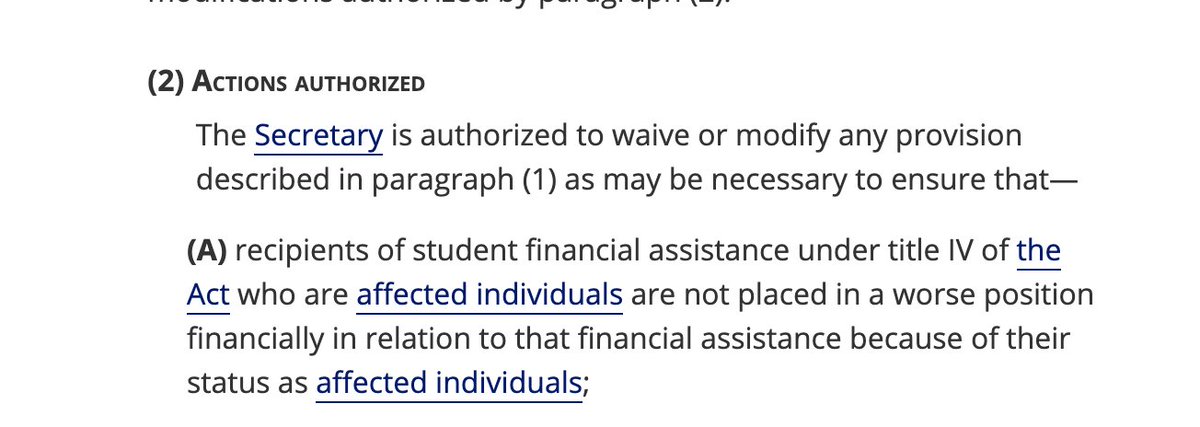
Jed Shugerman@jedshug
Feb 28, 2023
55 tweets
I’ll live-tweet today’s Supreme Court oral argument on the Biden student debt waiver. 1/
Here’s my short essay explaining a new approach to Major Questions that checks both the Imperial Judiciary and the Imperial Executive:
papers.ssrn.com/sol3/papers.cf
2/ C-Span just switched to Solicitor General Prelogar now.
She starts where I told students exactly where the Govt would:
1. Earlier Waivers lead to defaults among those with lower income;
2. Standing Standing Standing.
She’s making the best start of this tough uphill argument.
3/ Thomas and Roberts ask how this broad waiver counts as a “modification,” and Prelogar responds that the statute includes “waive.”
Roberts replied that the full sentence is “waive a regulation,” not waive the full debt.
Roberts says this plain meaning doesnt cover mass waiver.
4/ Sotomayor and Alito ask about whether this is a "major question."
Prelogar: "It's a benefit program, without limiting rights or liberties."
It's a good answer, but Alito says Major Question Doctrine is about separation of powers, not just liberty interests.
She agrees.
5/ Alito asks about standing of MOHELA, the corporation created by Missouri.
Prelogar says MOHELA is separate and not "entangled."
Jackson emphasizes lack of entanglement, and Missouri is not "injured."
Prelogar: "Yes, not on the hook."
This is good exchange for Govt.
6/ Alito asks if there is precedent either way, or if it's a new standing question.
Prelogar agrees that it is a new fact-pattern, and precedents indicate no standing.
But the point is clear for Alito: Precedent does not stand in the way, so to speak.
7/ Sotomayor turns to Missouri State Supreme Court case ruling that this kind of state corporation is NOT the same as the state, no standing.
That's interesting.
Sotomayor & Prelogar agree that it would be odd for fed court to find standing if Missouri state courts would not.
8/ Barrett asks about federal cases, if fed-created corp is financially separate but has other kinds of overlapping interests.
Prelogar says fed govt can sue for those interests, but those overlapping interests aren't in this case.
These exchanges went very well for Prelogar.
9/ Roberts asks about Prelogar's major question answer that this is a benefit, not a limit on liberty interests.
Roberts asks about DACA/Regents case - a benefits program and, on an analogous question, a benefit counted as significant govt action under APA.
Good question.
10/ Prelogar tries to invoke Congress's ARP at beginning of Covid as a statute that anticipated some form of debt waiver (indirectly) as a tacit statement of intent about waiver.
That seems to be a huge stretch.
Counterargument: Congress considered but did not actually do it.
11/ Thomas circles back to full debt "waiver" as a statutory interp problem as beyond "waiving a regulation" or "modification."
Prelogar says Dept Ed could convert loan to interest free loan as a modification.
Sorry, that's not persuasive, not the same thing as full waiver.
12/ Sotomayor also gets back to standing. Turns to Pennsylvania tax credits and "self-inflicted" harms are not basis for standing.
Standing is clearly the emphasis for Jackson and Sotomayor so far, and it went well for Biden Administration.
13/ Kagan is going exactly where I wrote about the substantive problem here:
The broad program does not reflect a causal nexus to the emergency.
Kagan asks Prelogar to address state briefs on this point as "arbitrary and caprious."
14/ Prelogar says the Covid pandemic had national impact (yes, but that's not what the statute requires);
and many low income borrowers would default...
(but "many" is not the same as "all." This was not a good answer, given that the program makes no effort to show Covid cause)
15/ Gorsuch asks about "hard look" admin rule that agency must look at impact, not just costs;
A hard look at general principles like fairness. He says Ed Dept did not show any consideration of fairness.
Prelogar says the statute does not indicate this kind of consideration.
16/ Gorsuch then goes back to NY v. Commerce on state standing based on census and effect of citizenship question.
Prelogar says there was a direct effect: Citizenship question lowers participation and then lowers state funding.
(Seems like this isn't actually "direct")
17/ Kavanaugh suggests recent congressional failure was a problem, leading to back-up of an old statute for new policy goal.
Kavanaugh didn't quite spell it out, but hints at what I think is a really bad argument...
Why punish Biden admin for trying with Congress first?
18/ Why should it be a problem if a President tries to get specific authorization in Congess, and if Congress won't, there is a valid earlier statute as the basis for that policy (or partial policy)?
The relevant question is if the earlier statute is or isn't a valid basis.
19/ Kavanaugh goes right to the point I was emphasizing in my amicus brief, and then cites my amicus brief:
"A Case Study in Abuse of Executive Powers"
20/ Kavanaugh mentioned my brief on a history of abuse of emergencies:
"A professor calls this a case study in the abuse of emergency powers."
That's my amicus & essay:
"Major Questions and an Emergency Question Doctrine":
papers.ssrn.com/sol3/papers.cf
21/ I was a little too shocked after the question and frankly I only caught a bit of Prelogar's answer, but I think she said this was clearly an emergency.
I'll re-read the transcript, but as far as I heard, that misses my point about the pretextual abuse of real emergencies.
22/ Another round of questions on the causal nexus between Covid and the broad waiver program.
Again, Prelogar says the link is that Covid led to pauses, and re-start causes many to default.
But statute's causal framing "worse off financially" b/c of the emergency.
23/
a) Prelogar's answer does not explain why the program does not focus on the emergency itself; and
b) why extending a pause or incremental gradual repayment would be the policy that fits the statutory "modification or waiver" of a regulation & and the emergency
24/ James Campbell is the Nebraska Solicitor General.
This is either dumb or dumb/smart, bc the state with the sufficiently valid standing claim is:
1) MISSOURI and
2) Only through the state corp MOHELA
And obviously there are questions about why MOHELA isn't a plaintiff.
25/ It has been a big question (major question): Where is MOHELA?
The Missouri SG would be in a better position to answer all of the MOHELA questions and to answer why MOHELA isn't a plaintiff.
(Seems like they didn't want to answer that question. And this seems smart/dumb).
26/ Smart, because the Nebraska SG can play dumb and give loose and speculative answers that would be less acceptable from the Missouri SG.
But DUMB, b/c it is a glaring absence, and it highlights how MOHELA really does not want to be a party, and Missouri is dodging that.
27/ I have to say that this oral argument is going very badly for the James Campbell, the Nebraska SG.
His standing answers for MOHELA were a mess, and the questions got sharp, even from Barrett.
Now on the merits, Kagan is SHREDDING him.
His answers don't make sense on hypos.
28/ Kagan asks hypos about debt waiver, and I'm not sure the hypos were really analogous, but the SG's answers were desperate and stubborn and non-responsive.
Kagan can't hold back laughing at him. I don't blame her.
29/ The SG says that Congress didn't address this kind of waiver.
Kagan says it did by adding the word "emergency."
The problem is that Kagan is missing the point of the statutes causal requirement in the statute, "worse off financially."
30/ Here is the statute:
A loan modification/waiver should be "necessary to ensure" [one is] "not placed in a worse position financially in relation to that financial assistance because of their status as affected individuals" i.e. affetcted by the emergency.
31/ Barrett is asking the right series of questions about moratorium/pause vs. total waiver, and also that connection to the emergency.
Difference of degree vs. kind.
The Nebraska SG did ok there, but only because Barrett was setting all of that up with softballs.
32/ Jackson on statutory basis for "waiver":
Nebraska SG says their brief at p. 29-30 shows a series of other statutes where Congress uses clear language when it wants to empower this kind of broad waiver of debt, not "waiver of a provision."
Good use of "whole code" canon.
33/ It's trending 6 to 3 against the program on the merits, the substance. (Kagan focused on emergency, the easy question, and little concern about causal nexus, the real question).
But do all 6 conservatives think Missouri has standing? I don't know. And the facts are fuzzy.
34/ The Nebraska SG had just one job today:
Explain why Missouri has standing based on independent Corp MOHELA.
And he didn’t.
It’s up to the six conservatives to dig back in on their own and come up with a new precedent.
How much do they want to?
35/ Now the individual plaintiffs case, Brown and Taylor, on procedural problems.
Roberts asks about arbitrary and capricious distinctions problem here, like Equal Protection.
Prelogar gives good answer from standing: redressability.
But not responsive on substance.
36/ Sorry I missed 5 minutes of Prelogar.
Roberts & Alito go back to the "hard look" problem on fairness considerations w/r/t other debtors who paid earlier.
And Alito is asking again.
It isn't enough for Prelogar to say now it is fair.
The agency arguably had to say address it.
37/ Kagan points to the word "emergency" and say "this is all fine."
Not even asking questions, just making an argument from the bench.
I expected more nuance on emergency pretexts, but this is the author of "Presidential Administration" for expansive exec/presidential power.
38/ If the 6 conservatives were struggling with standing in this case, I think they'd be using their time asking Prelogar about standing here, but maybe that was the 5 minutes I missed?
It's tough to get a read here. Standing is a big problem, and it's not getting resolved here.
39/ FWIW, I pointed to Mass v. EPA's "special solicitude" for state standing in my amicus brief, and I didn't hear the Nebraska SG mention anything like it.
Maybe he thinks the Justices aren't as open to this argument (EPA case was lefty), but his own arguments went very badly.
40/ Now Connolly for private debtor Brown.
I am curious about how this standing argument will go...
Thomas asks first if there any precedent standing from notice & comment.
Connolly cites Summers & EPA/ Burnt Ridge...
41/ Jackson says that the plaintiffs need to show that the administration would have used HEA, if they didn't use HEROES...
And Connolly gives a great answer: The broad waiver fits the HEA, likely they'd use it.
Sotomayor says HEA would be no remedy.
She totally missed the point.
42/ Brown and Taylor want process, notice & comment. They say the right statute for this broad waiver is the HEA (true), and its process offers notice & comment (true).
And they are injured by the reliance on HEROES instead of HEA.
This is not that complicated.
43/ I understand if Sotomayor and Jackson think the "fairly traceable" requirement is not met by those indirect steps, or the likelihood is too low, but Brown's/Connolly's argument is clear enough.
Now Roberts gets it, and he's asking the right questions on causal nexus.
44/ Roberts is asking if the possibility of using a different statute is too speculative, and that's a fair argument against these plaintiffs. Big problem.'
But now Kagan is talking superficially about the word "emergency" again. Kagan is again missing the point.
45/ So far, I am most surprised by Kagan missing the substance & the strategy today.
Sotomayor and Jackson are focusing on the most pivotal question & the most strategic question for their outcome:
STANDING.
Kagan keeps repeating the same weak & troubling substantive argument.
46/ Back to standing:
Connolly has a good answer for sensible limits on procedural standing:
The plaintiff has to be covered by the proposed policy and would have had process under the valid statute, instead of the invalid statute that had been used.
This makes sense.
47/ I am surprised Kagan keeps missing the point.
She keeps saying HEROES is valid.
But the majority of Justices do not.
The appropriate line of questions should assume arguendo, if HEROES isn't valid, is the possibility of HEA sufficient for standing.
48/ Jackson gets it. Her question is "What is likelihood plaintiffs would get remedy? Likelihood the Biden admin would turn to HEA? What evidence?"
That's exactly the right question.
Connolly is giving good answers about this broad program, the 2020 campaign, Sen. Warren...
49/ Kavanaugh asks "Why didn't Admin use the HEA process?"
Connolly says it's a long process. He's right. Reg Neg takes a year & no slam dunk to give a president exactly what they want.
That's why they avoided it.
And that's why Congress required it!
Process is also substance.
50/ Kagan interrupts him to say the word "Emergency" again as if it's a magic word that solves all statutory and procedural problems.
I wrote my amicus brief with her, Kavanaugh (and Roberts) in mind.
Kavanaugh got it and cited it in a question.
Kagan just didn't get it at all.
51/
Sotomayor & Jackson knew the cases turn on standing. In my mind, they raised enough doubt about both Missouri/MOHELA & the private plaintiffs.
I no longer think it is clear any plaintiffs have standing.
And I don't know how the conservatives would draw lines here, either.
52/ Here's my gut sense, w/ caveat that I missed 5-10 minutes where standing was likely argued:
1) If the 6 conservatives were really struggling with standing, they would have focused on it asking both sides the same questions in the same tone.
Only 1 Justice did: Barrett.
53/
And 2) Roberts & Kavanaugh focused on the merits & so troubled by merits that they clearly want to get to the merits.
They asked standing questions, but not with Barrett's angst.
It's possible they struggle w/ that, but it seemed less likely to me.
54/ So my tentative prediction, without much confidence:
The Court rules 5-4 for Missouri/MOHELA and against the program. Barrett says Missouri doesn't have standing. Kavanaugh writes majority (maybe citing "state standing"/federalism basis for standing).
Brown loses on standing.
55/
SG Prelogar was terrific. Outstanding.
She was dealt a tough hand, a complicated case in 3 or 4 different substantive/procedural areas, a hot bench, and a LONG day.
I didn't agree with her on much, but on standing, she may have snatched victory from the jaws of defeat.

Jed Shugerman
@jedshug
Prof @FordhamLawNYC JD/PhD History & Dad Jokes. @cncrisishotline Podcast. https://t.co/pNx2Rx4e3U https://t.co/Rdnudr0EcV Book: “The People’s Courts”
Missing some tweets in this thread? Or failed to load images or videos? You can try to .
